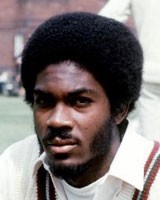West Indies Cricket Fans Forum
Fire in Babylon celebrates the West Indies' domination of world cricket

The West Indies' spectacular, unparalleled domination of world cricket throughout the 1970s and '80s was an awesome thing to behold.
But, as this illuminating feature-length documentary makes plain, it represented a lot more than mere mastery of leather and willow.
British writer-director Stevan Riley picks up the story in the 1960s, as Caribbean nations began winning independence from Britain, but the West Indies Test team was still regarded as a bunch of entertaining but uncompetitive "calypso cricketers".
Ambition quickly grew among the players and their fans – to improve their performances on the field, to transcend old stereotypes and injustices, and to inspire the people of the Caribbean to a brighter future.
As we see here, the turning point was the 1975-76 Test tour of Australia, which the West Indies lost 5-1 amid a physical bruising from Dennis Lillee and Jeff Thomson, unrelenting hostility from Australian players and racist abuse from Australian fans.
Captain Clive Lloyd realised that to be competitive his team would need, among other things, a fast-bowling attack as intimidating as Lillee and Thomson.
Such was well and truly assembled by the time the West Indies landed in England later in 1976, and if any further motivation was needed it was supplied by England's South African captain, Tony Greig, who declared that he would make them "grovel".
The rest, as they say, is history.
For a broader historical context, though, Riley solicits insights from several Caribbean historians, and the film is interspersed with performances by Caribbean musicians that highlight the inspiration that cricketers and musicians gave one another.
As for those cricketers, Riley assembles a veritable who's who – Lloyd, Viv Richards, Michael Holding, Andy Roberts and Deryck Murray, to name a few.
Some of the most incisive insights come from batsman Gordon Greenidge, who had lived in England as a teenager in the '60s, was thoroughly familiar with English racism and knew how important the success of the West Indies team was to other Caribbean immigrants in Britain.
The film is at once celebratory and sobering, an important record of an important time in the history of cricket and the Caribbean, and an absolute delight to watch.
Guyana Diaspora Forum
We have a large database of Guyanese worldwide. Most of our readers are in the USA, Canada, and the UK. Our Blog and Newsletter would not only carry articles and videos on Guyana, but also other articles on a wide range of subjects that may be of interest to our readers in over 200 countries, many of them non-Guyanese We hope that you like our selections.
It is estimated that over one million Guyanese, when counting their dependents, live outside of Guyana. This exceeds the population of Guyana, which is now about 750,000. Many left early in the 50’s and 60’s while others went with the next wave in the 70’s and 80’s. The latest wave left over the last 20 years. This outflow of Guyanese, therefore, covers some three generations. This outflow still continues today, where over 80 % of U.G. graduates now leave after graduating. We hope this changes, and soon.
Guyanese, like most others, try to keep their culture and pass it on to their children and grandchildren. The problem has been that many Guyanese have not looked back, or if they did it was only fleetingly. This means that the younger generations and those who left at an early age know very little about Guyana since many have not visited the country. Also, if they do get information about Guyana, it is usually negative and thus the cycle of non-interest is cultivated.
This Guyana Diaspora Online Forum , along with its monthly newsletter, aims at bringing Guyanese together to support positive news, increase travel and tourism in Guyana and, in general, foster the birth of a new Guyana, which has already begun notwithstanding the negative news that grabs the headlines. As the editor and manager of the publication, I am committed to delivering Blog entries and Newsletters that are politically balanced, and focused on the positive ideas we wish to share and foster among Guyanese.
| ||||

